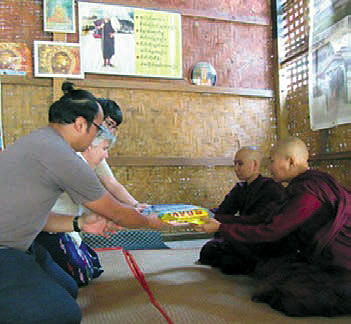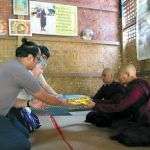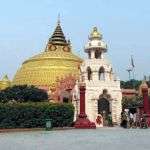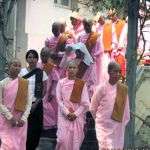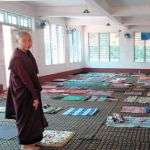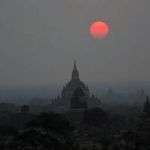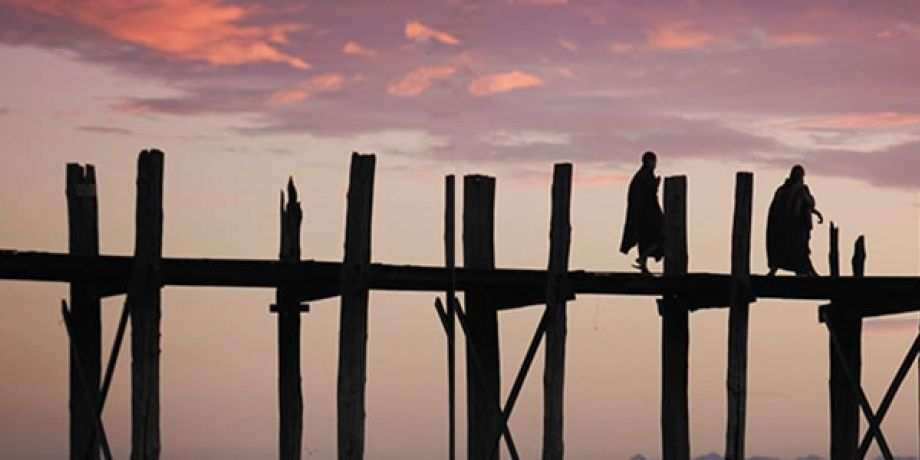
Beginnings of Dialogue
Shwebo dropped us at our last stop, and he headed off to return to his village, the Shwebo district from which he gets his name. We returned to the Sisters’ house and had dinner. The next day Columban Sr. Kathleen brought us to her Buddhist friends up the hills of Sagaing. She explained that the Bagan plains is the Buddhist historical capital, but the Sagaing Hill is the lived experience capital of Buddhism. Interestingly and beautifully the hills were alive, dotted with pagodas and monasteries. To get to the hills we have to cross the Irrawaddy River from Mandalay. Two bridges cross the river, one made by the British, the new one built by the Chinese.
We first visited Sitagu Buddhist University which is probably the largest in Myanmar (formerly Burma). A beautiful pagoda was built to welcome everyone. Images of Buddha from all over the world can be found in it. Surprisingly even in Pakistan which is now predominantly Muslim, Buddhism flourished for many centuries. After that we headed to the monastery of Buddhist nuns, and we just missed the shaving of the heads of two young ladies entering the monastery. But we were able to witness the robing of the ladies. The ceremony happened on a platform behind us. The head nun led the ritual. She presented both ladies with their robes.
The robes were different from the usual pink ones I have seen. These robes were dark brown, and they also received their prayer mats. After the ritual was completed, Sr. Kathleen payed homage to the head nun and the rest of the nuns. She invited us to join her as she presented some gifts to them. We held out the gifts and gave them to the head nun. We then bowed three times before the nuns, and the nuns gave their blessings. I remember in Fiji, when visiting a certain village or parish, one is also expected to present some gifts to the host as well.
The nuns are members of a larger sangha, or group of monks. We went to their larger monastery were a lot of people are also staying for meditation. We were greeted by Sr. Kathleen’s friend, an elderly monk who came to participate in last year’s interfaith lunch hosted by the Sacred Heart Cathedral in Mandalay. Then suddenly I hear the familiar sounds of a “lali,” a Fijian wood drum that is used to call people. It turns out that a similar drum is used by the Buddhists to call people! This time I was told the drum was signalling lunch. They invited us for lunch, but we decided not to join them and return to Mandalay.
This year, the Thingyan festival coincides with the celebration of the Holy Week. By tradition, water is used to metaphorically wash away the sins. This reminds me of what the Holy Week meant for many of us Catholics – our sometimes fanaticism with sin. In the Philippines we do not just wash ourselves with water, but if we could, we would drown ourselves with it, because we want to be saved. We fast and abstain, and some even hurt themselves, but we forget what is more important. We have forgotten that we cannot save ourselves alone. It is in God’s love incarnated in Christ Jesus that we are saved. It is love that renews us. Easter brings to us a new life just like Thingyan is to the Burmese Buddhists.
It can’t be helped, but for most of my time here, I always find myself looking for similarities of Myanmar with my former mission home in the Fiji Islands or my home country, the Philippines. For instance, when learning the Burmese language I try to see what it is in Hindi or what practices are similar between Burmese and Fijians or Indians. And in many instances I see the little things that remind me of my former mission or my home here in Myanmar. Dialogue is in finding and walking with our similarities in spite our differences. But dialogue is also celebrating our differences which gives greater life and light and brings about surprises and hope.
Just like Shwebo who saw me as a Filipino “ponjee,” or monk, I also see him and Myanmar through my eyes that understands the world through my worldview shaped by my faith and experience. In the dialogue of life, we are the gifts we bring to each other. Dialogue is the act of giving and receiving gifts. This journey has just begun.
Columban Fr. Kurt Zion Pala lives and works in Myanmar.
Image Gallary:
